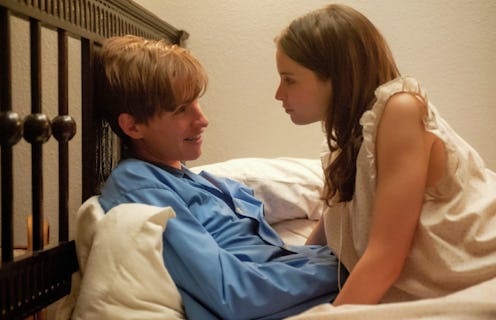Entertainment
How Feminist Are 2015's Oscar Hopefuls?

This year’s Oscar hopefuls shouldn’t slip out of mind without receiving their due credit — so far in 2014, we’ve seen Eddie Redmayne’s impressive transformation into Stephen Hawking, Richard Linklater’s spawling love letter to childhood, and Michael Keaton’s descent into blockbuster-induced madness. But that doesn’t mean that every movie in discussion for the Best Picture Academy Award isn’t without its flaws. In fact, there is one consistent problem you might notice in the lot of these films: their female characters.
That’s not to say that 2014 is without its impressive heroines — Scarlett Johansson plays three, in fact — but the Oscar heap of the year just happens to be lacking in the Bechdel department. Some movies on the trophy shortlist are simply devoid of female players altogether; others squander their talented leading ladies on lesser, even regrettable material.
Of course, the degree of these malfeasances varies between pictures. Some awards favorites are downright abysmal when it comes to feminist ideologies, while others should be lauded for their outstanding character in the market. While we look at the quality of writing, directing, and acting in the movies called upon as possible candidates for the next Best Picture Oscar, it is just as important to take hone in on their strengths and weaknesses in the category of female roles.
THE WORST: BIRDMAN
While Birdman is a vital and impressive cinematographic turn, some of its elements come up a little weak, most of all its women. Granted, everyone in the movie is supposed to be a caricature of some kind, but at least Michael Keaton and Edward Norton get to play interesting and evocative caricatures.
Andrea Riseborough and Naomi Watts are relegated to lamenting the follies of their respective troubled gentlemen (and kissing, for some reason), Amy Ryan is little more than a hardened shoulder for Keaton to cry on, and Emma Stone — admittedly, the film’s best female character, and possibly its best performance too — has all her interesting bits shirked in favor of an oddball romance with the convoluted Norton.
THE BAD: THE THEORY OF EVERYTHING
We couldn’t expect too much of The Theory of Everything to stray from its main focus: Stephen Hawking (who, incidentally, is a man). That said, there must have been some point in Jane Hawking’s long, admittedly arduous marriage to the motor neuron disesase-inflicted scientist that she managed to have a conversation about… anything, anything other than him.
While Felicity Jones gives a fine performance as Jane, she never really gets to spread her wings beyond playing the reactionary party to star Eddie Redmayne’s suffering and genius. Even when another woman is ushered into the cast (Maxine Peake, playing Elaine Mason), they have almost nothing to say to each other… and the few times they do chat, it is all, of course, Stephen-related.
THE DECENT: INTERSTELLAR
For a Christopher Nolan movie, Interstellar is practically Norma Rae . Yes, scientist and astronaut Anne Hathaway does let her sentimentality overpower her logical side in the throes of a mission, but she isn’t entirely vilified for the antic — in fact, love is championed by the film as the most important element within and beyond the scope of reason (although Hathaway’s sobby speech midway through the film isn’t exactly helping any causes).
Jessica Chastain, also playing a scientist, is an even better testament to the female backbone, charged principally by her intellect, faith in possibility, and devotion to her father. Now, if only either of these ladies had another woman to talk to… like, at any point at all in this movie…
THE GOOD: BOYHOOD
Funnily enough, a film called Boyhood is strapped with even better female characters than it has male. The story, as it were, is told through the lens of wide-eyed, deliberately passive Mason (Ellar Coltrane), who grows up around his loving but emotionally rattled mother (Patricia Arquette) and kooky, affably distant sister (Lorelei Linklater).
While both Arquette and Linklater’s principal screen partner is Coltrane, neither one falls victim to his shadow — perhaps due to the character’s natural introversion, or simply to their own fluorescent personalities. Either way, Boyhood turns in two terrific supporting female roles.
THE BEST: GONE GIRL
The David Fincher film took a bit of fire for ostensibly undercutting the validity of domestic abuse by transplanting the blame entirely to the hands of its heroine, Rosamund Pike. But somehow, this doesn’t come off as a detractor to the “Yes All Women” movement as much as it does an overview of the conversation entirely. Ultimately, Pike plays one of the most fun, wicked, brilliant characters that 2014 has in store for viewing audiences, with the likewise terrific Kim Dickens carrying to audience on her wonderfully cunning back in the pursuit of this mystery’s ever evasive answers.
Images: Focus Features (2); Fox Searchlight Pictures; Paramount Pictures; IFC Films; 20th Century Fox